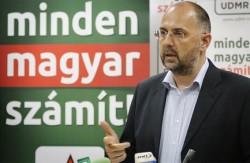 3/8/2014 - UDMR (RMDSZ) Joins Coalition Government in Rumania, AHF calls for quick resolution to pressing problems...On Monday, March 03, 2014, Prime Minister Victor Ponta of Rumania’s Social Democratic Party (USD) announced that the Democratic Union of Hungarians in Romania (UDMR) would be joining the governing coalition. In the agreement, USD promised to help solve the problem of minority cultural rights. The UMDR will hold the Culture and Environment ministries, a vice-president seat, and 14 state secretary positions. The [full list appears below]. 3/8/2014 - UDMR (RMDSZ) Joins Coalition Government in Rumania, AHF calls for quick resolution to pressing problems...On Monday, March 03, 2014, Prime Minister Victor Ponta of Rumania’s Social Democratic Party (USD) announced that the Democratic Union of Hungarians in Romania (UDMR) would be joining the governing coalition. In the agreement, USD promised to help solve the problem of minority cultural rights. The UMDR will hold the Culture and Environment ministries, a vice-president seat, and 14 state secretary positions. The [full list appears below].
AHF Statement for Immediate Release
March 9, 2014 [download]
_____________________________
UDMR Joins Coalition Government in Romania:
AHF Calls for Quick Resolution to Pressing Problems
On Monday, March 03, 2014, Prime Minister Victor Ponta of Romania’s Social Democratic Party (USD) announced that the Democratic Union of Hungarians in Romania (UDMR) would be joining the governing coalition. In the agreement between the two parties, USD promised to help solve the problem of minority cultural rights and bring resolution to the conflict over re-establishment of Hungarian-language education at the University of Medicine and Pharmacy of Târgu Mureș (Marosvásárhely). The UDMR will hold the Culture and Environment ministries, a vice-president seat, and 14 state secretary positions.
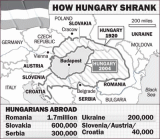 The American Hungarian Federation (Federation), representing a cross-section of the Hungarian American community, strongly supports cultural diversity, democratic development and human and minority rights for all people. Romania, which was awarded large parts of Hungary after WWI, including Transylvania, is home to a substantial Hungarian minority. After the fall of the brutal Ceausescu regime, the ethnic Hungarian community, which played a pivotal role in sparking the uprising that toppled Ceausescu, expected dramatic improvements and an end to government-sponsored repression and discrimination. They understandably expected to realize their democratically asserted aspirations for autonomy, preserve their language and cultural identity, and recover previously confiscated church and communal properties. The American Hungarian Federation (Federation), representing a cross-section of the Hungarian American community, strongly supports cultural diversity, democratic development and human and minority rights for all people. Romania, which was awarded large parts of Hungary after WWI, including Transylvania, is home to a substantial Hungarian minority. After the fall of the brutal Ceausescu regime, the ethnic Hungarian community, which played a pivotal role in sparking the uprising that toppled Ceausescu, expected dramatic improvements and an end to government-sponsored repression and discrimination. They understandably expected to realize their democratically asserted aspirations for autonomy, preserve their language and cultural identity, and recover previously confiscated church and communal properties.
Unfortunately, many of these just demands have not been met, despite decades of legal wrangling. For example, while Bucharest lavishly funds the Orthodox Church that is engaged in a church building spree in areas with large Hungarian populations, it has returned only a tiny fraction of the more than 2000 religious and communal properties illegally seized from their rightful Hungarian owners during the Communist era and has unjustly prosecuted former state secretary Attila Marko, Silviu Vlim and Tamas Marosan in connection with the restitution to the Hungarian Reformed Diocese of Transylvania of the Szekely Miko Evangelical Reformed College. Finally, despite agreements to respect the historic multi-cultural institution, Romanian officials expelled Hungarian professors Peter Hantz and Lehel Kovacs from the Babes-Bolyai University for placing parallel Hungarian inscriptions below Romanian language signs.
We sincerely hope that the new coalition government will effectively resolve issues that impede reconciliation, work toward building a tolerant society, respect the rights of its Hungarian and other minorities and the rule of law, and convert promises into deeds. This would promote genuine democracy in Romania and defuse tensions caused by discrimination and intolerance.
Bryan Dawson
AHF Executive Chairman
Member AHF International Affairs Committee
The New Government
- Liviu Dragnea (PSD) – Minister of Regional Development and Public Administration, deputy
- Gabriel Oprea (UNPR) – Minister of Internal Affairs, deputy
- Daniel Constantin (PC) – Minister of Agriculture, deputy
- Kelemen Hunor (UDMR) – Minister of Culture, deputy
- Titus Corlatean (PSD) – Minister of External Affairs
- Mircea Dusa (PSD) – Minister of National Defense
- Robert Kazanciuc (PSD) – Minsiter of Justice
- Ioana Petrescu (independent) – Minister of Public Finances
- Attila Korodi (UDMR) – Minister of Environment and Climate Changes
- Nicolae Banicioiu (PSD) – Minister of Health
- Remus Pricopie (PSD) – Minister of National Education
- Gabriela Szabo – Minister of Youth and Sport
- Dan Sova (PSD) – Minister of Transport
- Rovana Plumb (PSD) – Minister of Labour
- Constantin Nita (PSD) – Minister of Economy
- Florin Jianu – Delegate Minister of Tourism, small business
- Aurelia Cristea (PSD) – Minister of Dialogue Social and Civil Society
- Razvan Cotovelea – Delegate Minister for Information Society
- Eugen Teodorovici – Minister of European Funds
- Liviu Voinea – Minister of Budget
- Razvan Nicolescu – Delegate Minister for Energy
- Bogdan Stanoevici – Delegate Ministers for Romanians Everywhere
- Eugen Nicolicea (PSD) – Delegate Minister for the Relation with the Parliament
- Mihnea Costoiu – Delegate Minister for Superior Education, Research and Technological Development
[< Go to all AHF news] |
Related News
 Új programot fogadott el a Romániai Magyar Demokrata Szövetség (RMDSZ) részvételével alakult kormány. Úgynevezett felelősségvállalással, vagyis parlamenti vita lehetősége nélkül készül a törvényhozás elé terjeszteni – közölte az Agerpres hírügynökség. Az új kormányprogram létrehozása Victor Ponta szociáldemokrata miniszterelnök és a jobboldali Traian Basescu államfő előző napi megállapodásának része volt: az elnök azzal a feltétellel nevezte ki az új minisztereket, hogy Ponta a parlament előtt vállal felelősséget az RMDSZ-szel kötött megállapodás nyomán kialakított programjáért. [tovább] Új programot fogadott el a Romániai Magyar Demokrata Szövetség (RMDSZ) részvételével alakult kormány. Úgynevezett felelősségvállalással, vagyis parlamenti vita lehetősége nélkül készül a törvényhozás elé terjeszteni – közölte az Agerpres hírügynökség. Az új kormányprogram létrehozása Victor Ponta szociáldemokrata miniszterelnök és a jobboldali Traian Basescu államfő előző napi megállapodásának része volt: az elnök azzal a feltétellel nevezte ki az új minisztereket, hogy Ponta a parlament előtt vállal felelősséget az RMDSZ-szel kötött megállapodás nyomán kialakított programjáért. [tovább]
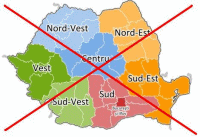 Hungary to intervene in support of Szekler council’s fight against Romanian administrative plans:
Hungary has decided to intervene in support of the Szekler National Council in its case at the Luxembourg court, appealing against a recent European Commission decision to reject its request for ethnically and culturally different regions to receive special treatment. The Szekler council was hoping to collect one million signatures in support of its fight against Romanian plans to change the country’s administrative districts. [read more] Hungary to intervene in support of Szekler council’s fight against Romanian administrative plans:
Hungary has decided to intervene in support of the Szekler National Council in its case at the Luxembourg court, appealing against a recent European Commission decision to reject its request for ethnically and culturally different regions to receive special treatment. The Szekler council was hoping to collect one million signatures in support of its fight against Romanian plans to change the country’s administrative districts. [read more]
 Magyar prefektusa lehet Brassó és Maros megyének:
A tárgyalások még folyamatban vannak, de a legnagyobb bizonyossággal állítható, hogy Maros és Brassó megyében lesz magyar prefektus – jelentette ki Kovács Péter, az RMDSZ főtitkára. Több romániai napilap is kormányközeli forrásokra hivatkozva közölte, hogy az RMDSZ három prefektusi és öt alprefektusi tisztséget kap a koalíciós osztozkodás során. A Romániai Magyar Demokrata Szövetség (RMDSZ) kormányra lépése eredményeként magyar prefektusa lesz Brassó és Maros megyének – erősítette meg pénteken a romániai sajtó értesüléseit Kovács Péter, az RMDSZ főtitkára.
[tovább] Magyar prefektusa lehet Brassó és Maros megyének:
A tárgyalások még folyamatban vannak, de a legnagyobb bizonyossággal állítható, hogy Maros és Brassó megyében lesz magyar prefektus – jelentette ki Kovács Péter, az RMDSZ főtitkára. Több romániai napilap is kormányközeli forrásokra hivatkozva közölte, hogy az RMDSZ három prefektusi és öt alprefektusi tisztséget kap a koalíciós osztozkodás során. A Romániai Magyar Demokrata Szövetség (RMDSZ) kormányra lépése eredményeként magyar prefektusa lesz Brassó és Maros megyének – erősítette meg pénteken a romániai sajtó értesüléseit Kovács Péter, az RMDSZ főtitkára.
[tovább]
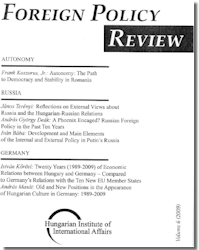 4/7/2010 -- AHF article on Autonomy for Romania's Hungarian Communities published in Foreign Policy Review...The article entitled, "Autonomy: The Path to Democracy and Stability in Romania," Foreign Policy Review, volume 6 (2009)," makes a compelling case for the recognition of autonomy as a means of strengthening democracy and stability in Romania. The author, AHF President Frank Koszorus, Jr.,* points out that since autonomy is about power sharing, it is an essential element in a country such as Romania insofar as democracy also is about power sharing. 4/7/2010 -- AHF article on Autonomy for Romania's Hungarian Communities published in Foreign Policy Review...The article entitled, "Autonomy: The Path to Democracy and Stability in Romania," Foreign Policy Review, volume 6 (2009)," makes a compelling case for the recognition of autonomy as a means of strengthening democracy and stability in Romania. The author, AHF President Frank Koszorus, Jr.,* points out that since autonomy is about power sharing, it is an essential element in a country such as Romania insofar as democracy also is about power sharing.
[Download the Press Release]
[Download the Article]
[Download the Foreign Policy Review Scanned Image]
Shortcuts to Additional Resources:
Why So Many Hungarians Across the Border?
 One thousand years of nation building successfully delineated groups based on culture, religion, geography, and other attributes to create the countries with which we are so familiar. While some Western European nations would continue power struggles and princely battles and civil wars, Hungary, founded in 896, was a peaceful multi-ethnic state for a 1000 years and her borders were virtually unchanged. Until 1920... One thousand years of nation building successfully delineated groups based on culture, religion, geography, and other attributes to create the countries with which we are so familiar. While some Western European nations would continue power struggles and princely battles and civil wars, Hungary, founded in 896, was a peaceful multi-ethnic state for a 1000 years and her borders were virtually unchanged. Until 1920...
The Treaty of Trianon in 1920... in the aftermath of WWI, was extremely harsh on Hungary and unjustifiably one-sided. The resulting "treaty" lost Hungary an unprecedented 2/3 of her territory, and 1/2 of her total population or 1/3 of her Hungarian-speaking population. Add to this the loss of up to 90% of vast natural resources, industry, railways, and other infrastructure. The clear winner of the land grab, was Rumania, who, established only 60 years earlier, more than doubled in size overnight.
Ethnic Distribution in the Kingdom of Hungary in 1910 (Hungarians shown in red)
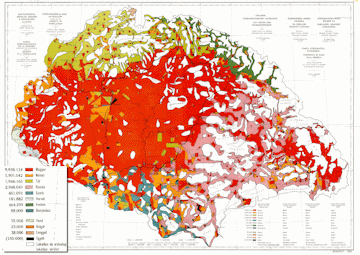
[download extra large image 4962x3509]
[download large image 1000x707]
Hungarian populations declined significantly after forced removals such as the Benes Decrees and other pograms, the effects of WWI, and Trianon in 1920. With continued pressure and discriminative policies such as the 2009 Slovak Language Law, this trend continued over the past 90 years.
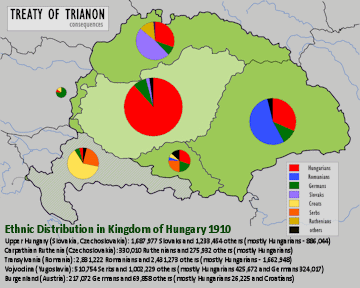
- In Upper Hungary (awarded to Slovakia, Czechoslovakia): 1,687,977 Slovaks and 1,233,454 others (mostly Hungarians - 886,044, Germans, Ruthenians and Roma) [according to the 1921 census, however, there were 1,941,942 Slovaks and 1,058,928 others]
- In Carpathian Ruthenia (awarded to Czechoslovakia): 330,010 Ruthenians and 275,932 others (mostly Hungarians, Germans, Romanians, and Slovaks)
- In Transylvania (awarded to Romania): 2,831,222 Romanians (53.8%) and 2,431,273 others (mostly Hungarians - 1,662,948 (31.6%) and Germans - 563,087 (10.7%)). The 1919 and 1920 Transylvanian censuses indicate a greater percentage of Romanians (57.1%/57.3%) and a smaller Hungarian minority (26.5%/25.5%)
- In Vojvodina 510,754 Serbs and 1,002,229 others (mostly Hungarians 425,672 and Germans 324,017)
- In Vojvodina and Croatia-Slavonia combined (awarded to Yugoslavia): 2,756,000 Croats and Serbs and 1,366,000 others (mostly Hungarians and Germans)
- In Burgenland (awarded to Austria): 217,072 Germans and 69,858 others (mainly Croatian and Hungarian)
[read more on the Treaty of Trianon]
AHF Statements on Trianon:
Selected AHF Articles on Rumania:
 You will need the free Adobe Reader to open the following files. Click the image to download. You will need the free Adobe Reader to open the following files. Click the image to download.
Articles and Essays by AHF Members
- "NATO Enlargement" by Frank Koszorus Jr. March 29, 2004
Remarks on the Occasion of the Enlargement of NATO, Corcoran Gallery of Art, Washington, D.C. [download]
---
- "Nato Enlargement And Minority Rights: Prerequisites To Security" by Frank Koszorus, Jr., April 2003
A memorandum that was submitted to Robert A. Bradtke, Deputy Assistant Secretary for European and Eurasian Affairs, and Heather A. Conley, Deputy Assistant Secretary for European and Eurasian Affairs during a roundtable discussion on "NATO Enlargement and the Current State of the Trans-Atlantic Alliance." This submission follows several other intiatives, including submissions to Lord Roberston, Secretary General of NATO. [download]
---
- “Nato Enlargement: Promoting Western Values, Strengthening The Alliance” by Frank Koszorus, Jr., April 29, 2003
A Statement Before The United States Senate Committee On Foreign Relations.
[download]
---
- "U.S. Senate Unanimously Ratifies Nato Treaty; Senators Raise Rights Of Minorities: Federation Supports Efforts Aimed At Encouraging Romania And Slovakia To Respect Rights Of Hungarian Minorities And Restore Communal Properties" - Press Release by Zoltan Bagdy, May 9, 2003 [download]
Congressional Resolutions and Records
- H.RES 191 - A RESOLUTION urging the "prompt and fair restitution of church properties by Romania and Slovakia - TOM LANTOS / TOM TANCREDO (April 6th 2005) in the House of Representatives [download]
- A RESOLUTION REGARDING THE ISSUE OF TRANSYLVANIAN HUNGARIANS -- HON. DONALD E. `BUZ' LUKENS (Extension of Remarks - February 26, 1990) in the House of Representatives [download]
- VIOLENCE IN TRANSYLVANIA -- HON. DON RITTER (Extension of Remarks - March 22, 1990) in the House of Representatives [download]
- Transylvanian Monitor #14: Property Restitution.
Join online!

|



